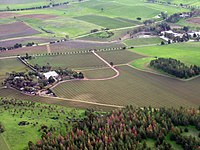
Photo from wikipedia
Abstract Urbanization entails social, economic and environmental changes that can transform how people relate to nature and disconnect them from it, with consequences for their wellbeing. The impacts of urbanization… Click to show full abstract
Abstract Urbanization entails social, economic and environmental changes that can transform how people relate to nature and disconnect them from it, with consequences for their wellbeing. The impacts of urbanization on human-nature relationships viewed through people’s ecosystem service (ES) preferences are however poorly understood, especially in the rapidly urbanizing Global South. We tested the hypothesis that, although both urban and rural people depend on ES, people in cities would value ES less because they are less directly connected to ecosystems. Using a paired urban–rural study design, we conducted 200 interviews with urban and rural dwellers along the coast of the Solomon Islands, a Small Island Developing State (SIDS), to compare the importance they attributed to different ES and ecosystem disservices (EDS) for wellbeing, as well as their satisfaction with ES. Although urban and rural dwellers reported that ES were very important for their wellbeing, urban dwellers’ ratings were lower, supporting our hypothesis. Urban dwellers were less satisfied than rural dwellers with the benefits that they received from ES and would have preferred to benefit more, showing that they were less connected to nature. Both urban and rural dwellers perceived important negative impacts from EDS. Thus, even a relatively recent urbanization process can alter people’s relationships with nature, reducing significantly the benefits that people derive from ecosystems. Urban planning and environmental management can help reconnect people to nature and create more sustainable cities by addressing people’s needs and preferences towards nature, as revealed through ES and EDS socio-cultural valuation.
Journal Title: Ecosystem services
Year Published: 2020
Link to full text (if available)
Share on Social Media: Sign Up to like & get
recommendations!